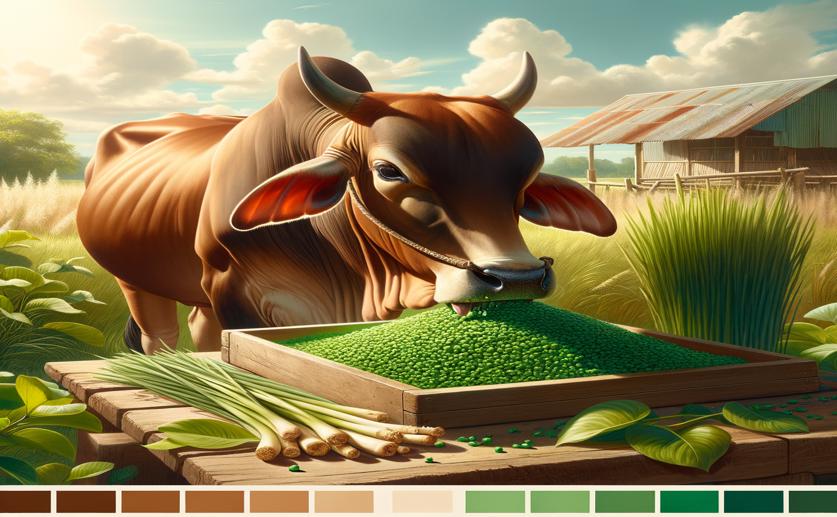Boosting Cow Digestion with Plant Nutrient Pellets and Lemongrass

Image Source: Natural Science News, 2024
Key Findings
- Study at Rajamangala University found that MARABAC and lemongrass reduce methane in cow digestion
- These supplements also improve the breakdown and use of food in the cow's stomach
- Best results were seen with 2% MARABAC and 2% lemongrass in the diet
In recent years, the agricultural sector has been exploring innovative ways to enhance the productivity of livestock while also addressing environmental concerns, particularly those related to greenhouse gas emissions. Methane, a potent greenhouse gas, is produced by ruminant animals such as cows and buffaloes during digestion. Researchers at Rajamangala University of Technology Thanyaburi have focused on finding sustainable solutions to mitigate methane emissions from these animals[1].
The study from Rajamangala University of Technology Thanyaburi has made a significant stride in this area by investigating the effects of phytonutrients—beneficial plant compounds—on rumen fermentation and methane production in ruminants. The research centered on two phytonutrients: saponins and condensed tannins, found in various tropical plants. The team developed a pellet, named MARABAC, made from mangosteen, rambutan, and banana flower, and combined it with lemongrass powder to test their effects on in vitro rumen fermentation.
The experiment was meticulously structured, using a 3x3 factorial arrangement in a completely randomized design, to assess the impact of varying levels of MARABAC pellet and lemongrass powder on the digestive process. The researchers found that supplementing ruminant diets with these phytonutrients significantly improved the kinetics of gas production and the production of propionate, a beneficial rumen fermentation end-product. Most notably, the addition of MARABAC and lemongrass powder led to a reduction in methane production, a key goal for environmental sustainability.
Moreover, the study showed that these supplements could enhance the degradability of dry matter and organic matter in the rumen, indicating a more efficient digestion process. The best results for methane mitigation and fermentation enhancement were observed with the highest levels of supplementation—2% MARABAC pellet and 2% lemongrass powder.
These findings dovetail with previous research that has explored the use of phytonutrients in ruminant diets. For instance, an earlier study found that rambutan peel powder, when combined with urea, improved milk yield and composition in dairy cows without affecting feed intake, suggesting that certain phytonutrients could enhance animal productivity[2]. Similarly, the MARABAC pellet, comprised of tropical fruit peels, was previously shown to improve nutrient digestibility and reduce methane production in beef cattle[3]. Another study demonstrated that phytonutrients from mangosteen peel and banana flower could improve rumen fermentation and decrease methane emissions in swamp buffalo[4].
The current research builds upon these earlier studies by combining the effects of MARABAC with lemongrass, thus expanding the repertoire of phytonutrient sources for ruminant diets. This synergy between different phytonutrients could offer a more potent solution to the dual challenge of enhancing animal productivity and mitigating environmental impact.
The implications of this research are significant for the future of sustainable livestock farming. By incorporating these natural supplements into ruminant diets, farmers could potentially reduce their reliance on chemical additives and antibiotics that are commonly used to enhance rumen fermentation. The use of MARABAC pellet and lemongrass powder could thus represent a natural and eco-friendly alternative for improving the efficiency of ruminant digestion and reducing the carbon footprint of livestock production.
In conclusion, the study from Rajamangala University of Technology Thanyaburi provides promising evidence that phytonutrient supplementation, particularly with MARABAC and lemongrass powder, can be an effective strategy in the quest for more sustainable livestock farming practices. These findings may pave the way for further in vivo trials and potential widespread adoption of these practices in the agricultural industry.
HerbsAgricultureAnimal Science
References
Main Study
1) Combination effects of phytonutrient pellet and lemongrass (Cymbopogon citratus) powder on rumen fermentation efficiency and nutrient degradability using in vitro technique.
Published 8th March, 2024
Journal: Tropical animal health and production
Issue: Vol 56, Issue 2, Mar 2024
Related Studies
3) Supplementation of fruit peel pellet containing phytonutrients to manipulate rumen pH, fermentation efficiency, nutrient digestibility and microbial protein synthesis.
https://doi.org/10.1002/jsfa.11096
Related Articles





 8th February, 2024 | David Palenski
8th February, 2024 | David Palenski